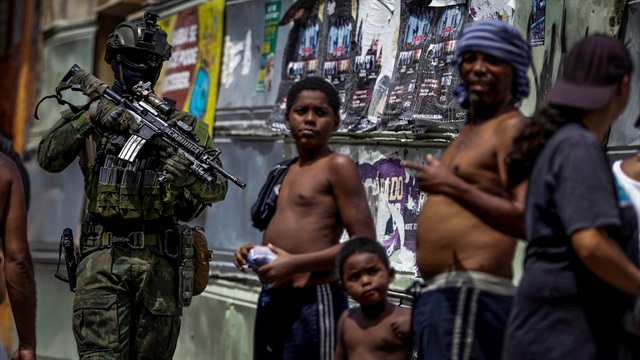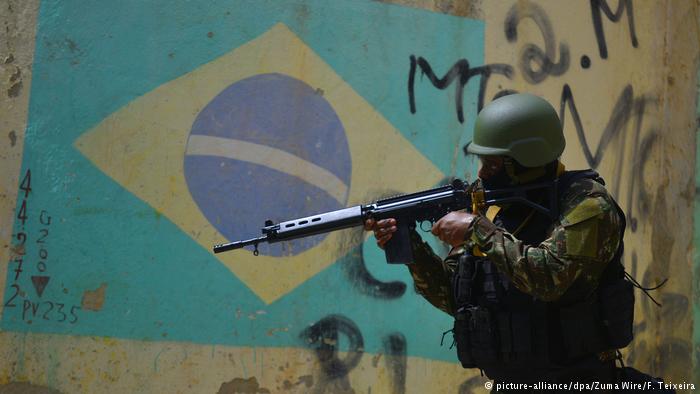Photo credits: F. Teixeira
What is the military intervention?
Last week, Brazilian President Michel Temer ordered military intervention in Rio de Janiero– the first time since the CIA-backed military dictatorship that ended in the 1980’s. This will give extensive dictatorial powers to the army in the second largest city in the country, while the government will remain in the hands of Governor Luiz Fernando Pezão.
Infamous for his leading role in the repression of Rio’s favelas in the lead up to the Olympics, General Walter Souza Braga Netto is in charge of the military intervention. His expanded powers, ostensibly for maintaining public safety, are not subordinate to the governor of Rio de Janiero. Instead, he will have absolute autonomy under the president. In other words, any initiative in relation to public security needs to go through Netto, not the elected legislative branch in Rio. Additionally, the intervention will concentrate the whole of the repressive forces from the federal police to the spy agencies into the umbrella of the Ministry of Public Security. Although it is still under discussion who would lead this empowered agency, top generals from the Brazilian intervention in Haiti are on the shortlist. This intervention was characterized by mass violence and strike-breaking.
As soon as this iniative was approved by Congress, 3,000 members of the military spread across Rio de Janiero– in addition to the police already on the ground. They took up positions on major roads and armored vehicles patroled the city.
The Crisis in Rio de Janiero
Rio de Janiero is known as the “cidade maravilhosa” (marvelous city), known for it’s beautiful beaches and samba music, yet it also remains a city of jarring inequalities, with beautiful beachfront apartments that cost millions of dollars while surrounded by favelas full of predominantly Black Brazilians who confront abject poverty, police and gang violence on a daily basis.
The economic crisis in Brazil hit Rio hard. The unemployment rate is at 15%. There are 14,000 homeless people, compared to just 5,000 in 2013. On a regular basis, workers receive their monthly salary weeks or even months late. The State University has not had regular classes in over year and the the faculty have been on strike for most of the last year and a half.
A regular chant heard at protests is that the police kill poor people every day. This is not an exaggeration. Police actions in the favelas murder hundreds of people a year, including children such as Eduarda, a 13 year old girl murdered while in school by a “stray bullet”. During police stings, the children in Rio spend hours on the ground, with their head covered, waiting for shootouts to end. The “marvelous city” is full of police who patrol the city with their rifles out the windows of their cars as if to begin shooting at any moment.
The problem of gang violence, and police versus gang violence, terrorizes the civilian population. Not a day goes by without hearing gunshots. In 2017, there were 6,731 violent deaths in the state of Rio, or 40 per 100,000 residents . Yet, Rio de Janiero is not the most violent city (much less state!) in Brazil. In some surveys, it is number 23. In others it isn’t even in the top 30.

Phoro credits: Reuters / Bruno Kelly
The issues in Rio are structural and economic. Rather than addressing any of the structural issues in Rio, the federal government’s intervention is to promote military intervention while seeking to promote austerity.
In the midst of these structural issues, Rio de Janiero has been the stage for mass expressions of discontent. From a workers movement against the privatization of water to two general strikes last year, Rio’s working class has expressed their frustration. Furthermore, the Party of Socialism and Liberty’s candidate Marcelo Freixo went to a runoff election for the mayor, demonstrating an affinity with left ideas and politics.
The mass rejection of austerity and of the Temer Presidency was evident at this year’s Carnaval celebration, where the usual festival of drunken debauchery was marked by political protest. As some street parties, hundreds of people broke into chants of “Fora Temer” (Out with Temer). In the parade of Samba Schools, broadcast live on TV with millions of viewers, two Samba schools featured anti-Temer and anti-austerity protests. One in particular highlighted the racist elements of Temer’s policies, tracing the history of Black Brazilians. Only a few days after Carnaval, Temer militarized Rio de Janiero.
Why Now?
President Temer has notoriously low approval ratings- as low as 3%. He has taken advantage of these low approval ratings to ram through massive austerity measures– a labor reform law that reverts many existing protections for workers, a freeze on all spending on education and health care and is now seeking to pass pension reform. However, Temer was unable to pass the pension cuts through Congress, unable to get the majority votes he needed. In this context, there are two interconnected reasons that Temer militarised Rio.
In the first place, this is a publicity stunt to win support for his terrible image. As much of the population is worried about “public safety”, with the robberies and shoot-outs , Temer seeks to give an “easy answer” by being a President for public safety.
Secondly, the extreme militarization of Rio de Janeiro seeks to intimidate and silence those who resist Temer’s attacks. In order to pass the austerity measures, Temer has to discipline Brazilians who mobilized to express rage against Temer.
This calamitous policy will have devastating consequences for the city’s black and poor population, already targeted by police. As Diana Assuncao of the Movement of Revolutionary Workers says, “We know that the first victims of the military intervention will be Black and poor people. We know that “stray bullets” always find Black bodies. The police is ready to repress workers mobilizations… and this military intervention is at the service of continuing the repression against workers and Black people. We must fight these attacks from the government. We must organize assemblies in our workplaces and places of stude to defeat pension reform, all government attacks, for the people’s right to vote for whoever they want in the elections and against the military intervention in Rio.”










